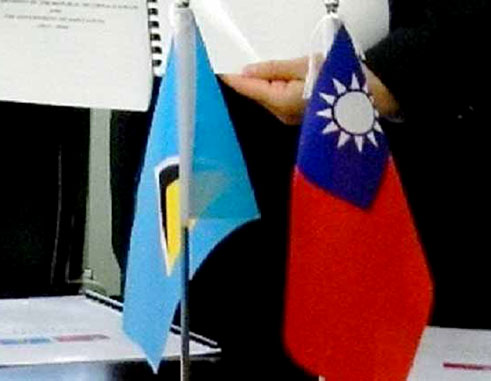Taiwan seeks Support to attend top aviation meet in Montreal
Taiwan is banking on its Caribbean and Latin American allies to support its quest to attend the world’s top civil aviation meeting in Canada later this month and to get more responsibility for the skies in and around its airspace.
Taiwanese President Tsai Ing-wen is calling on mainland China to “set aside the baggage of history” and work with Taipei to develop “a new direction and new approaches” to sharing of responsibility for the safety and security of the skies across the waterway that has for six decades divided and unified the tiny island and the giant mainland.
Tsai’s call – made during her inauguration in Taipei on May 20 — is strongly backed by the island’s Mainland Affairs Council (MAC), the leading agency involved in exchanges between the two sides on matters pertaining to everything from air and sea transport to aviation and tourism, business and trade.
The MAC’s support – in a statement on August 4 — came ahead of the upcoming International Civil Aviation Organization (ICAO) 2016 Assembly, to be held from September 27 to October 5 at its headquarters in Montreal, Canada.
But this will not be the first ICAO meeting Taiwan will attend — if approved by Beijing.
Taiwan is not a member of the UN, but Taipei sent a delegation in 2013 – with mainland support — after the island’s Civil Aeronautics Administration (CAA) was invited by the ICAO to that year’s assembly.
But three years ago, everything was different, including a different President in Taipei.
Beijing had no problem not opposing Taiwan’s attendance back then, providing it did so under “a proper name”. So the two sides agreed for Taiwan to participate as “Chinese Taipei”.
Under the same name, Taiwan also got China’s blessings to participate in the World Health Organization (WHO) and in the Olympic Games (in Beijing and Rio).
But the new government in Taipei isn’t leaving everything to hope and chance this time. It wants to start a new chapter in stalled Cross Strait ties with an agreement to share more responsibility for the skies above and between the Straits, beginning with a new page at this month’s ICAO meeting in Montreal.
Hopefully paving the way to turn the new leaf, MAC says it believes that “the differences in social systems that exist in Cross Strait relations can be resolved through communication, consultation, increased exchanges and improved understanding.”
It also expressed hope that “the two sides can trust and support each other to jointly usher in a new era in Cross Strait relations.”
But even while hopeful, Taipei is still uncertain about Beijing’s response to its request to again be allowed to attend what is considered the world’s aviation summit this month-end.
Taipei has done all it expects to be asked to by Beijing.
The MAC says it has “fully exchanged views with the Taiwan Ministry of Transport and Communications (MOTC)” on participation in the meeting. It says the island’s Civil Aeronautics Administration (CAA) “has also submitted an application to the ICAO Assembly President.”
The CAA has also applied to participate in this year’s ICAO Assembly “as the authority in charge of international aviation security and safety of cross-Strait travel.” This is what Taipei wants most – and is playing by Beijing’s rules to get it.
Apart from the CAA’s application being submitted under “a proper name,” the MAC has also reassured Beijing that Taiwan “is willing to follow the relevant rules for participation in ICAO meetings.”
And this is where Taiwan is counting heavily on Caribbean and Latin American support.
The MAC says it “will seek support from the ICAO members” – which include 12 Caribbean and Latin America states: Belize, Dominican Republic, El Salvador, Guatemala, Haiti, Honduras, Nicaragua, Paraguay, Panama, St. Kitts and Nevis, Saint Lucia and St. Vincent and the Grenadines.
These comprise over half of Taiwan’s 22 diplomatic allies worldwide. But Taipei has also been lobbying other friends in Africa, North America, Asia and Europe to back its ICAO bid this time around.
Barring unforeseen circumstances, Taiwan’s dozen Caribbean and Latin American diplomatic allies are most likely to again support its bid to be in Montreal. Likewise, the over 70 countries (including the USA, Canada, UK and many EU member states) that established non-diplomatic trade ties with Taipei under the previous Ma Ying-jeou administration.
Not that any of Taiwan’s allies can be expected to directly influence China to take any position it does not want to. But the hope in Taipei is that any and all expressions of support will or may help persuade Beijing not to oppose the presence of ‘Chinese Taipei’ in Montreal when the next ICAO Assembly starts on September 27. (The Diplomatic Courier)











![.[L-R] Parliamentary Representative for Castries Southeast, Lisa Jawahir & Talk show host, Timothy Poleon](https://thevoiceslu.com/wp-content/uploads/2026/02/Lisa-Jawahir-Timothy-Poleon-380x250.jpg)
![Public Service and Utilities Minister Stephenson King delivered remarks [Photo credit: VP]](https://thevoiceslu.com/wp-content/uploads/2026/02/Stephenson-King-380x250.jpg)

